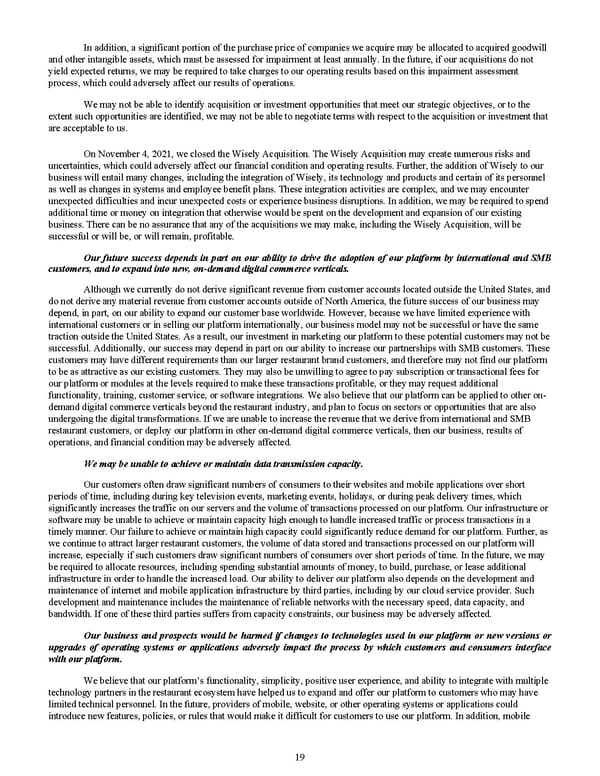In addition, a significant portion of the purchase price of companies we acquire may be allocated to acquired goodwill and other intangible assets, which must be assessed for impairment at least annually. In the future, if our acquisitions do not yield expected returns, we may be required to take charges to our operating results based on this impairment assessment process, which could adversely affect our results of operations. We may not be able to identify acquisition or investment opportunities that meet our strategic objectives, or to the extent such opportunities are identified, we may not be able to negotiate terms with respect to the acquisition or investment that are acceptable to us. On November 4, 2021, we closed the Wisely Acquisition. The Wisely Acquisition may create numerous risks and uncertainties, which could adversely affect our financial condition and operating results. Further, the addition of Wisely to our business will entail many changes, including the integration of Wisely, its technology and products and certain of its personnel as well as changes in systems and employee benefit plans. These integration activities are complex, and we may encounter unexpected difficulties and incur unexpected costs or experience business disruptions. In addition, we may be required to spend additional time or money on integration that otherwise would be spent on the development and expansion of our existing business. There can be no assurance that any of the acquisitions we may make, including the Wisely Acquisition, will be successful or will be, or will remain, profitable. Our future success depends in part on our ability to drive the adoption of our platform by international and SMB customers, and to expand into new, on-demand digital commerce verticals. Although we currently do not derive significant revenue from customer accounts located outside the United States, and do not derive any material revenue from customer accounts outside of North America, the future success of our business may depend, in part, on our ability to expand our customer base worldwide. However, because we have limited experience with international customers or in selling our platform internationally, our business model may not be successful or have the same traction outside the United States. As a result, our investment in marketing our platform to these potential customers may not be successful. Additionally, our success may depend in part on our ability to increase our partnerships with SMB customers. These customers may have different requirements than our larger restaurant brand customers, and therefore may not find our platform to be as attractive as our existing customers. They may also be unwilling to agree to pay subscription or transactional fees for our platform or modules at the levels required to make these transactions profitable, or they may request additional functionality, training, customer service, or software integrations. We also believe that our platform can be applied to other on- demand digital commerce verticals beyond the restaurant industry, and plan to focus on sectors or opportunities that are also undergoing the digital transformations. If we are unable to increase the revenue that we derive from international and SMB restaurant customers, or deploy our platform in other on-demand digital commerce verticals, then our business, results of operations, and financial condition may be adversely affected. We may be unable to achieve or maintain data transmission capacity. Our customers often draw significant numbers of consumers to their websites and mobile applications over short periods of time, including during key television events, marketing events, holidays, or during peak delivery times, which significantly increases the traffic on our servers and the volume of transactions processed on our platform. Our infrastructure or software may be unable to achieve or maintain capacity high enough to handle increased traffic or process transactions in a timely manner. Our failure to achieve or maintain high capacity could significantly reduce demand for our platform. Further, as we continue to attract larger restaurant customers, the volume of data stored and transactions processed on our platform will increase, especially if such customers draw significant numbers of consumers over short periods of time. In the future, we may be required to allocate resources, including spending substantial amounts of money, to build, purchase, or lease additional infrastructure in order to handle the increased load. Our ability to deliver our platform also depends on the development and maintenance of internet and mobile application infrastructure by third parties, including by our cloud service provider. Such development and maintenance includes the maintenance of reliable networks with the necessary speed, data capacity, and bandwidth. If one of these third parties suffers from capacity constraints, our business may be adversely affected. Our business and prospects would be harmed if changes to technologies used in our platform or new versions or upgrades of operating systems or applications adversely impact the process by which customers and consumers interface with our platform. We believe that our platform’s functionality, simplicity, positive user experience, and ability to integrate with multiple technology partners in the restaurant ecosystem have helped us to expand and offer our platform to customers who may have limited technical personnel. In the future, providers of mobile, website, or other operating systems or applications could introduce new features, policies, or rules that would make it difficult for customers to use our platform. In addition, mobile 19
 2022 10K Page 25 Page 27
2022 10K Page 25 Page 27